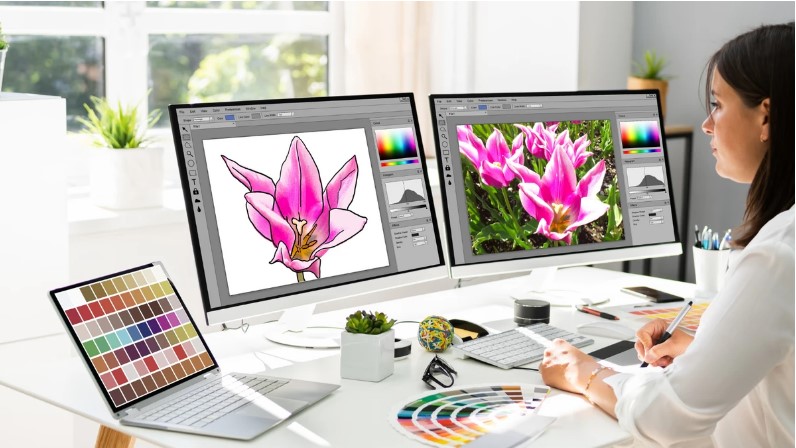In the world of graphic design, branding, and embroidery, clarity matters. Whether you’re printing a logo on a billboard or digitizing it for embroidery, blurry pixel-based images just won’t cut it. This is where vector artwork conversion becomes a game-changer. It takes your low-resolution, pixelated images and transforms them into sharp, scalable, professional-quality vector files.
And when precision matters, having a reliable online vector conversion service—like Digitizing Buddy—makes all the difference. Their expert team turns even the most basic image into a clean, scalable vector design suitable for any application: printing, engraving, or embroidery.
Let’s explore how converting your artwork from pixel to precision works and why it’s essential for creatives, businesses, and brands alike.
Table of Contents
What Is Vector Artwork?
Vector artwork is created using mathematical paths instead of pixels. This allows the image to scale infinitely without losing quality. Unlike raster images (JPG, PNG, BMP), which are made up of individual colored dots (pixels), vector graphics are made up of lines, curves, and shapes.
Common Vector File Formats:
- SVG (Scalable Vector Graphics)
- AI (Adobe Illustrator)
- EPS (Encapsulated PostScript)
- PDF (Vector-enabled)
These formats are ideal for logos, icons, illustrations, and designs used in branding, signage, and embroidery digitizing.
The Problem with Pixel-Based (Raster) Images
Pixel-based images look great on screens—but zoom in or try to scale them for a t-shirt, banner, or embroidery, and things fall apart:
- Blurry edges
- Low resolution
- Limited color editing
- Hard to separate elements
For businesses or creators looking to maintain visual quality across different mediums, vector conversion is not optional—it’s essential.
What Is Vector Conversion?
Vector conversion is the process of taking a raster image (like a JPG or PNG) and recreating it as a vector file using vector illustration software like Adobe Illustrator or CorelDRAW. This isn’t an automated “click-and-go” process. It requires:
- Redrawing by hand (manual vector tracing)
- Matching colors and gradients
- Recreating shapes and fonts
- Removing backgrounds or imperfections
When done right, the final file can be resized, recolored, or repurposed without any quality loss.
How Online Vector Conversion Services Work
Here’s what the typical process looks like:
1. Upload Your File
Submit your raster file (JPG, PNG, BMP, etc.) to a trusted service like Digitizing Buddy.
2. Design Evaluation
Experts assess the quality and complexity of your image. Some images may require simplification.
3. Manual Vector Tracing
Skilled designers recreate your image using vector tools to ensure perfect lines, smooth curves, and accurate color fills.
4. Delivery
You receive a clean, high-quality vector file in your desired format (SVG, AI, EPS, PDF, etc.).
Why Vector Conversion Is Crucial for Embroidery & Printing
Whether you’re digitizing a logo for embroidery or printing it on promotional items, the source file must be clean and scalable. Vector art guarantees:
- Precise digitizing for embroidery
- Sharp prints on fabric, mugs, and merchandise
- Fast processing for laser cutting and engraving
- Easy recoloring and editing without quality loss
Without a proper vector, your embroidery design might have jagged edges, missing details, or inconsistent stitches.
Benefits of Using a Professional Vector Conversion Service
While auto-tracing tools exist, they often produce sloppy, error-ridden results. Here’s why you should go pro:
| Feature | Auto-Trace Tools | Professional Vector Service |
| Accuracy | ❌ Inconsistent | ✅ Perfect linework |
| Background Removal | ❌ Messy | ✅ Clean & sharp |
| Editable Layers | ❌ Flattened image | ✅ Fully editable |
| Scalable Output | ❌ Limited | ✅ Infinite scalability |
| Customization | ❌ None | ✅ Fonts, colors, shapes |
Services like Digitizing Buddy specialize in manual vector conversion—ensuring every shape, line, and detail is on point.
Who Needs Vector Artwork Conversion?
Vector conversion isn’t just for designers. It’s essential for:
- Small businesses – Turn your logo into brand assets
- Clothing brands – Prep graphics for screen printing and embroidery
- Laser cutting enthusiasts – Create scalable, editable files
- Artists & crafters – Convert hand-drawn art into digital formats
- Marketing teams – Ensure print-ready collateral at all sizes
Fast Turnaround with Online Convenience
One of the best parts about modern vector conversion? You don’t need to download software or waste time learning design tools.
Just upload your image, and services like Digitizing Buddy handle everything. Most conversions are delivered within 24 hours—some even faster.
How Much Does Vector Conversion Cost?
Prices can vary based on image complexity. Simple icons might cost less than $15, while more complex designs (like multi-colored illustrations or detailed logos) might cost between $20–$50.
Digitizing Buddy offers affordable rates, free quotes, and bulk discounts for agencies and businesses.
Your Artwork Is Safe
Worried about your logo or artwork being misused? Reputable conversion services keep your files confidential and secure. Look for services with:
- NDAs or confidentiality policies
- Secure upload/download portals
- No reuse of your art without permission
Digitizing Buddy values client trust and handles every project with care and professionalism.
Final Thoughts – From Pixel to Precision in One Click
Don’t let low-quality artwork hold your projects back. Whether you’re preparing for print, embroidery, or digital use, vector artwork conversion is your first step toward polished, professional results.
Skip the auto-trace shortcuts and choose precision. Services like Digitizing Buddy make it easy, fast, and affordable to turn your pixelated graphics into versatile vector files that work anywhere—from shirts to signs to stitches.



